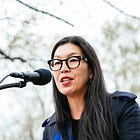For dementia caregivers, the heartache of impossible choices
Why every caregiver needs to find her own path--and a compendium of first-hand experience and resources to help light her way.
For a long time dementia was far from my mind. Now it is all around me. In so many conversations and experiences I encounter caregivers who carry with such courage the deep sadness of losing a loved one to dementia. This is not surprising but it is still sobering. The number of adults living with dementia worldwide is on course to nearly triple to 153 million by 2050. Dementia is a global emergency. Caregivers live in that state of emergency alongside their loved ones: weary, overwhelmed, and heartbroken.
On my recent yoga retreat in Hawaii, one of the women was called home after two days to be at her mother’s side as she succumbed to the final stage of the disease. Another woman in her early 70s had made the decision last spring for her husband to move to a memory care facility. At night she reaches across the empty bed for him and feels the loss anew. A woman in her early 50s was navigating the early stages of her mother’s dementia, balancing her mother’s desire to remain independent with a daughter’s worry over her safety.
All of us women at the Hawaii retreat were caregivers, whether it was for an elderly parent, a sick spouse, our children, our pets, our friends. One of the attendees is a hospice nurse, a caregiver by profession. She regards this ability to be with the dying and their families as a calling; a promise she made to her own late mother as she lay dying. In Hawaii, we had many profound conversations about giving and receiving love. We felt in our bodies and our hearts all the ways we could break if we give so much to others that we cannot take in love and have nothing left to give ourselves.
On my final day on the island, I spent several lovely hours with a new friend whose husband is in the early stages of dementia. It is not only heartbreaking for her active and otherwise healthy husband but I understand her anguish as she transitions from wife to caregiver. Plans for retirement are now derailed but she is bravely moving forward, appreciating the good moments and holding center. She asked me many questions about my experience with my mother, how I had made the decision to place my mother in memory care, and about the elusive stages of dementia. It is for her and for every woman struggling to be a good caregiver while holding onto her own life and her own destiny that I write “Living in 3D.”
Everyone’s experience as a caregiver will be different just as every loved one’s experience of dementia is different. What we all have in common is the need to be supported. I share my story and experience in the hope of supporting others. Too many caregivers are in it alone. This week, I offer readers a compendium of my previous posts about dementia caregiving
. I hope that caregivers find something helpful in these posts. My heart sees your heart. Let’s take care of each other.
(Note that posts older than 3 months are available in the archives for paid subscribers).












What a beautiful, heartfelt sharing of your experience in Hawaii -- what a great communion of sisterhood in caregiving!
I love this: "We felt in our bodies and our hearts all the ways we could break if we give so much to others that we cannot take in love and have nothing left to give ourselves."
Seriously, I have felt the same. How can our hearts not break open when we give so much of ourselves--and that's the way we women are intuitively, and often trained to be from early on. But centering--yes, that's the perfect word that reminds us, that in order to give of ourselves, we must be grounded and centered on ourselves.
Perhaps you or others have mentioned this: the 'concern' for dementia (I almost wrote 'fear of dementia', but this is too strong) as one ages, even if it doesn't seem manifestly present. It is natural to have memory lapses, even in one's 40s and 50s. When one is closing in on 88 (as I am) there is a tendency to question one's faculties. I concluded in my 60s or 70s that as one collects data and stores it somewhere in the noggin, the memory banks get quite full and quick access to it all sometimes fails. My mate (whom you know) has a family history of dementia in her female line. She is alert to her own faculties, sometimes mentioning the aging process (she's only 70). She cannot help but wonder if she will become afflicted as her forebears did. I see nothing like it in her, of course. We both are avid readers, electronic game/puzzle players (not 'gamers', fer sher), arguers over current issues, etc. But--will the dementia catch up with us before we cash in our chips? I certainly don't want to be a burden to my family and friends, should I lose my cognitive abilities. I am physically quite healthy, in comparison to others my age. If I should retain a healthy body but a failing cognitive system I can say, at this moment, I wouldn't want to 'live' this way. I wouldn't want to drag any of my loved ones down with me, deprive them of living their lives encumbered by my inability to care for myself. Some countries (I think Canada, for one) allow persons to end their lives under such circumstance. Is this worth discussing in these pages? I sometimes darkly joke that when the appropriate time comes, I'll "take a walk in the woods".